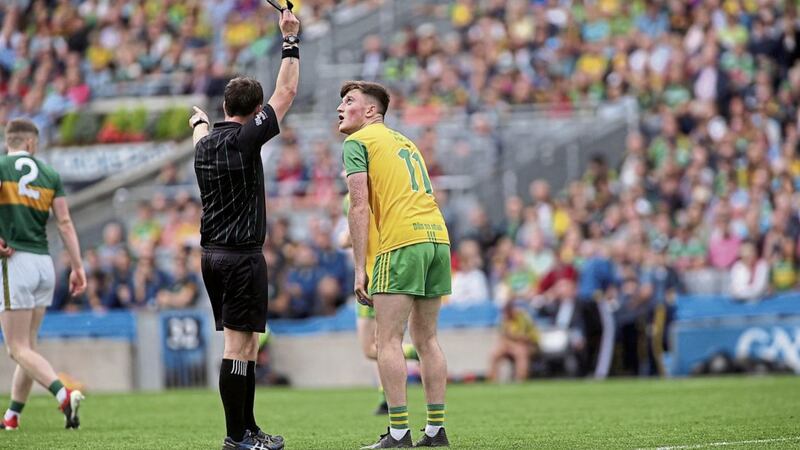ABUSE of the 10-minute sin-bin period under the new black card rule can only be halted by ensuring the clock stops during breaks in play, believes John McEntee.
The GAA will bring forward a rule to next month’s Annual Congress that will seek to pre-empt instances of teams feigning or milking injuries in order to run the clock down during the sin-bin period.
The rule will propose that any player who receives physio treatment during a game will have to leave the pitch until the next break in play, which would leave a team attempting to run the clock down facing a spell with 13 men.
Clontibret boss McEntee, who will remain with the Monaghan champions in 2020, believes the issue will only be solved if the GAA properly defines a “break in play”, and then stops the clock during one.
“For the 10-minute punishment, it should be a 10-minute punishment. There will be ways around this and teams will keep abusing it.
“It could be things like playing 14 men behind the ball, slowing kickouts down, taking whatever time you can out of marks, it could be feigning injuries, it could be a ball going out over the sideline and you kick it into the stand.
“If there’s a break in play called by the referee, the clock also needs to stop in those 10 minutes.”
The GAA, through its Standing Committee for Playing Rules, will also put forward a rule that would ban Maor Foirnes from entering the pitch, as is currently allowed at a break in play.
Teams have begun to abuse the existing run by sending the Maor Foirne on to act as a runner, with some teams appearing to instruct runners into certain areas of the pitch so as to interfere with play.
The issue came to a head last year when Dublin hurling Maor Foirne, Greg Kennedy, caught the ball when TJ Reid played a quick free for Kilkenny that would have led to a goal chance. Kennedy was subsequently banned for four weeks, but the incident led GAA officials to suggest that this proposed change would be in the offing.
While McEntee believes Maor Foirnes must be punished for any indiscretions, he feels a blanket ban on their entry to the pitch would be a step too far.
“Malpractice has to stop, but this is the problem with making laws on isolated incidents – it can lead to bad law. That’s the concern I’d have with this type of reactive response.
“There are rules in place to govern what the Maor Foirne is supposed to be doing, and if those rules were applied, we wouldn’t have these issues.
“Jason Sherlock does it because Jason Sherlock gets away with it, and other people do it because Jason Sherlock gets away with it.
“The odd official who one might say is pedantic, and others might say is doing the right job, but if it’s inequitable, there’s mistreatment of players and officials, and that’s not right.”
There have also been issues around water carriers and when they have been allowed on to the pitch. McEntee believes the latter must become independent but that they must be allowed on as and when they’re required.
“Why not make the waterboys independent? Put four independent waterboys in and that removes that issue.
“The reality is the player won’t leave his place to go and get a drink of water. If he leaves and the ball’s kicked to his man, he’s going to get ridiculed. We have to bring the water to the players.
“If we’re genuinely thinking about player welfare, that’s the sort of things we should be thinking about. Isolated incidents such as the Dublin hurling one, or a waterboy going on and squirting water in somebody’s face, those things should be dealt with very severely.
“That doesn’t mean the rules have to be changed to a point where every other player is penalised. The one thing that’s critically important in summer months when it’s warm, you’re asked to run a 150-metre field constantly for 40 minutes without a drink of water? It’s not on.”







